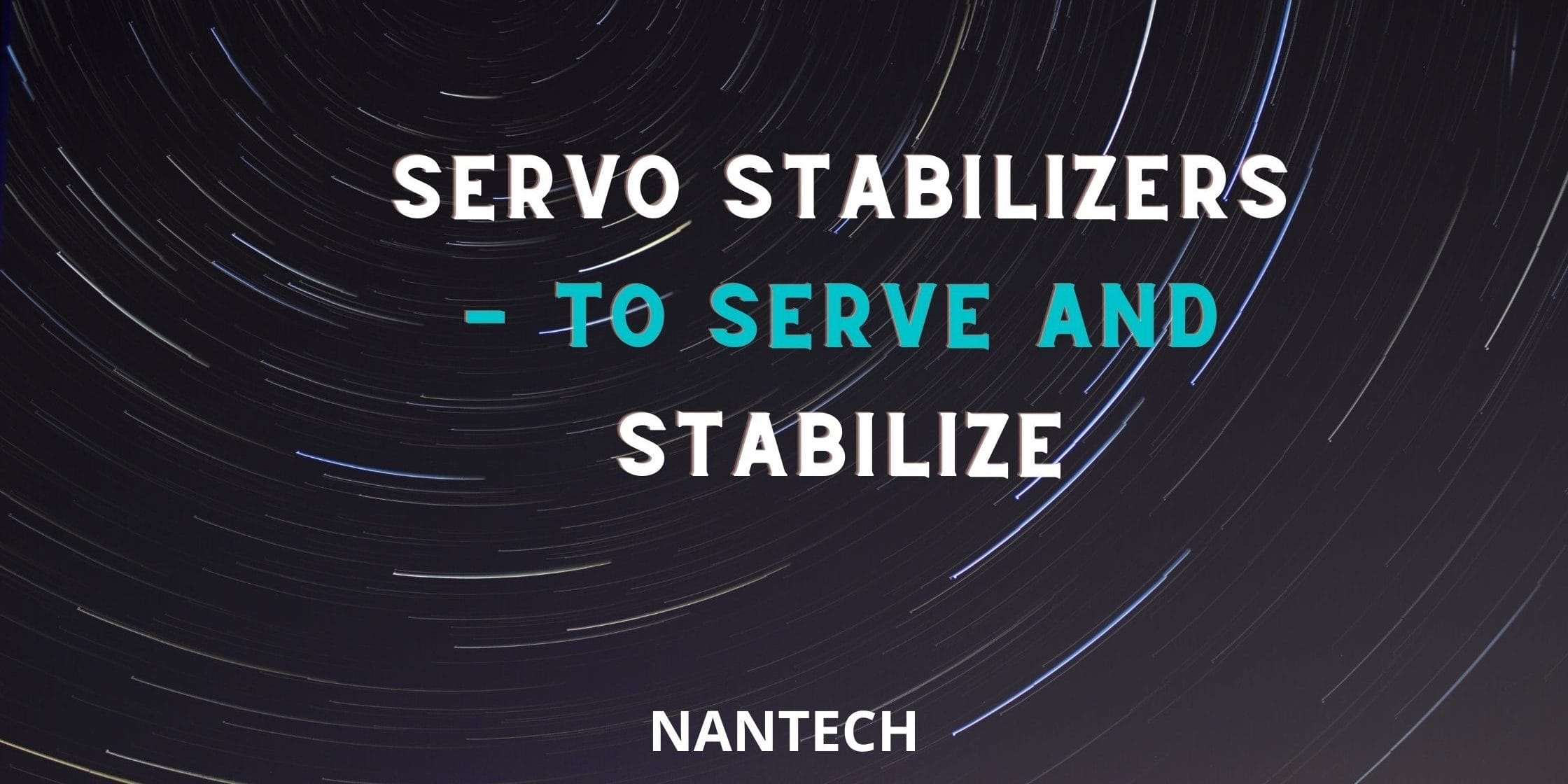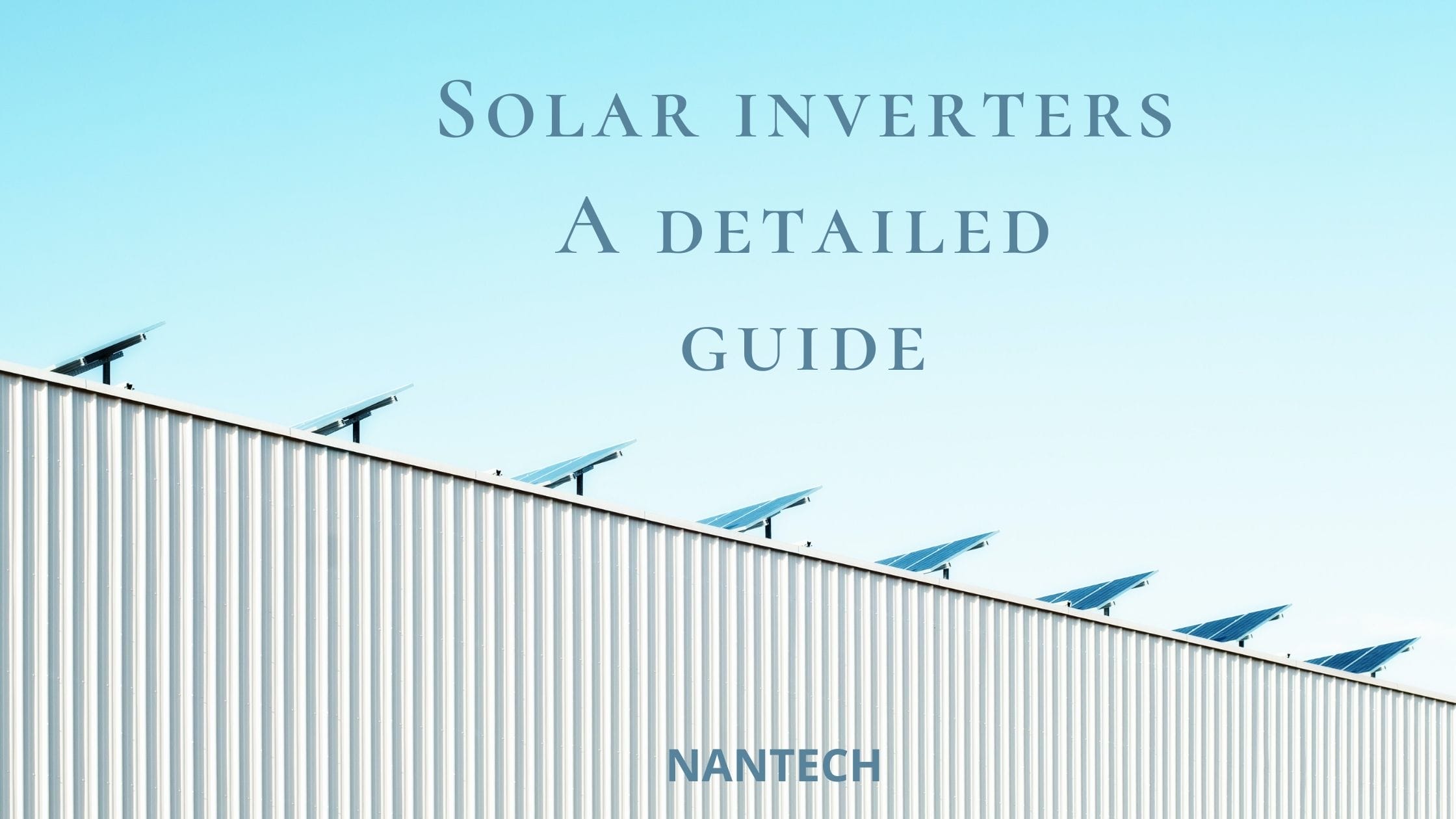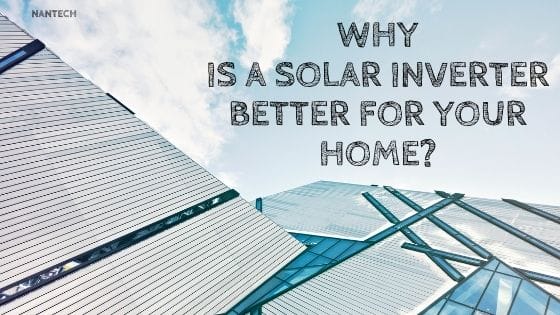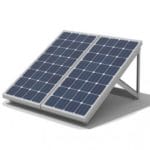- Home
- About us
- Products
- Dealer Enquiry
- Blog
- Contact Us
- Home
- About us
- Products
- Dealer Enquiry
- Contact Us
- 044 -2486 1994
- +91 99623 98222
- sales@nantech.in
- REQUEST A QUOTE

Inverters are devices that are very commonly used as a back-up during a power outage. Chennai faces such power cuts on multiple occasions. Although there is no power supply from the mains during a blackout, inverters keep supplying uninterrupted electricity. Inverters thereby act as reserves of electricity but can they also save electricity? If so, how do they do that? Let us find out.
How Do Power Inverters Function?
Can Inverters Have 100% Efficiency?
How Can Inverters Save Electricity?
How To Eliminate Losses?
It is observed that the higher the inverter capacity, the higher is the loss of energy. Thus, it is recommended to know the power requirement of your residence or workplace.
Also Read: Implications of Power Cut on Smart Homes & Remedial Measures
Overcharging:
Quality check:
Overload:
Maintenance:
Reach out to us if you are in search of an inverter that can 'save' electricity.

In Chennai, a power supply of an average of 1000MW is given by the power plants. The electricity that comes from these power plants is not clean. The harmonics can cause equipment malfunction or failure because of the voltage fluctuations and distortions in the supply line that can deteriorate the voltage quality. Harmonic Filters reduce risks by reducing harmonic – and you always want to keep the harmonic pollution to under 5%.
One way of reducing harmonic pollution is by using Harmonic Filters. A harmonic filter reduces harmonic pollution and improves Power Quality by dynamic filtering of currents. They are installed for plants and households to improve overall current and voltage outputs. They come in two variants – Active Harmonic Filters (AHF) and Passive Harmonic Filters (PHF).
Passive Harmonic Filters mitigate harmonics by filtering the current wave through an input reactor, output reactor, shunt reactor, and capacitor. They are only limited to individual and stable loads. They are usually limited to their effectiveness and capacity and cannot work with many non-linear loads.
Active Harmonic Filters are used to eliminate or mitigate harmonics from the power received by using a series of transistors and capacitors to clean the current fluctuations. They are larger than Harmonic filters and require more space. They are useful for factories where a constant electricity output is necessary. And they are most effective in maintaining businesses by guaranteeing reduced costs and ongoing outputs.
Also Read: What Are Active Harmonic Filters And Its Application?
In modern-day Chennai, as demand for more output increases, we must consider which filters we use for our plants. And we recommend AHFs over PHFs. Here’s why:
Since Chennai is now the hub for many businesses, Nantech has the best AHFs to buy in Chennai.
Happy Shopping!

Power cuts could prove detrimental to your machinery if they are not properly maintained. Depending upon the reason for the power cut, it has a different effect on the home. If an overload is causing abrupt spikes in electricity, the central power grid may get severely damaged and cause overheating of the appliances. If the power cut is due to undue power failure from the mains, it is usually less detrimental. Still, if it often occurs, in the long run, it may reduce the efficiency of your machinery as it pushes itself to function against the low voltage. Some machines require more energy to start rather than run for long durations. A higher electricity bill is consumed in regular power cuts, and a higher electricity bill is generated.
Power cuts could also be due to faulty wiring and structural weakness in the electricity grid at home. That endangers the lives of the inhabitants of the house and may even damage society's central grid. Faulty wiring is one of the lead causes of electricity-related fires globally and is highly prevalent in Chennai's developing areas like suburbs or rural areas surrounding Chennai. Not to mention; the gross inconvenience caused to the households. Computers may stop working, which may lead to loss of data or inadequate job productivity.
Refrigerators and microwaves might stop functioning, and if this goes on for long, a lot of food might get wasted. If the aqua-guards do not function, potable water might not be available. This problem is severe for Chennaites because of the severe water shortage already existing in the city. So, several issues can arise from power cuts. In June 2019, there was a power cut almost daily, affecting the health of lakhs of Chennaites amid summer!
So, let us take a look at some of the solutions:
Buy and use quality products and maintain them. Faulty wiring or low quality of semiconductors in the machinery itself may cause damage to both the machinery and the home's wiring. Make sure that all wires should be insulated, and the machine should not cause a shock.
If you notice that the current is facing fluctuations, it could be due to harmonic wave interference caused by low lights or switched-mode devices. It is advised by Nantech to install an active Harmonic filter or a servo stabilizer to prevent any power quality-related complications.
Ask your neighbours if they face a similar situation to determine if it is a problem in your house or a defect in the central electricity supply. If there seems to be a central problem, promptly inform the authorities. If it's a problem at home, check using a tester if there is any problem with the machine you are having trouble with. If you suspect some other cause, call a technician immediately.
This will ensure that you will not be a victim of power surges, and most of all, you will be protected from electrocution or fires that may prove to be fatal.

It is an automated electronic system built to attain constant voltage levels. They protect the appliances by forming a closed loop of an absolutely controlled system. Even if there is a fluctuation in the input voltage or load, the resulting output voltage will remain invariable. It is also commonly called Servo Controlled Voltage Stabilizer. It works on the principle of servomechanism or feedback. They are used for maintaining the accuracy of high voltages with an output correction of about +_ 1%. They are installed at various institutions like hospitals and clinics, food processing units, hotels, Flour mills, etc.
Chennai is currently the largest electronics hardware exporter in India. It contributes a major chunk of Indian exports. One such company based in Chennai is Nantech Power SystemsPvt Ltd. It is one of the most promising manufacturers and suppliers in the field of building powering equipment. A few specifications of its servo stabilizers are as follows:
Servo controlled voltage stabilizers are preferred over the other relay and static type of voltage stabilizers because they come with the exact system, react quickly to any variation in voltage, manufactured in a user-friendly manner with an overall well-equipped circuit ability to sustain a high voltage surge. There is absolutely no compromise on the security of the user. Furthermore, it acts like an amour for the appliance as well.

Solar Energy is now taking the world by storm. We can see this in the many advancements in technology by our Indian scientists and by the Indian Government's proactive legislatures. In 2018, the Chennai Civic Body had launched a Rs. 140 Crore venture project which plans on changing 70000 streetlights in over 15 zones, out of which 8 zones – Thiruvottiyur, Manali, Madhavaram, Ambattur, Valasaravakkam, Alandur, Perungudi, and Sholinganallur are all going have 17000 redone post lamps with streetlights introduced. Estimates are that this project could bring a 45% lessening in electricity consumption.
The focus is now on more greener and efficient technologies like solar streetlights, which use solar panels and LEDs. But why must you change over to Solar Street Lights? We shall present you with 5 compelling arguments to switch over to Solar Streetlights in Chennai!.
Solar Street Lights |
Conventional Street Light |
|---|---|
InstallationQuick, cheap, and easy to install, the poles are also powered by PV panels which provide electricity to LED lamps, with an inbuilt controller and battery. |
InstallationThese require much cable-laying and trenching required, which in turn means a large workforce and also a requirement of storage for heavy-duty batteries. |
MaintenanceSince solar energy is converted to electrical energy, there is no additional electricity cost. A battery can fully charge itself within 5 hours and then run for the next 12 hours. It is also weatherproof and dustproof, and rainy days aren't a problem. They are operational for the next 5 years. |
MaintenanceThe batteries need a lot of maintenance, including timely water topping, which increases labour costs. Since they are connected to an electric supply, street maintenance with a high electricity cost is quite difficult. |
SafetyThese are wireless and not connected to any electricity cables; hence there are no protruding wires and no accident threat. |
SafetySince there is much cabling involved, it is very unsafe as one can get electrocuted from the direct supply of electricity. There is also an additional threat of strangulation during the installation process. There is a possibility of a short circuit. |
EnvironmentThere is no energy cost since energy from the sun is directly being used. Since it uses green energy, there is no carbon footprint associated. There is also less light pollution since the lens used is of a special kind that adjusts brightness levels based on battery voltage and running times, thus reducing the light pollution and increasing the backup battery time. |
EnvironmentThese are connected to power grids, which are non-renewable energy sources and hence pollute the environment as a lot of carbon dioxide is released. Conventional Sodium or Metal Halide lamps also use mercury, which is very toxic to the environment. Light exposed sideways could lead to light pollution. |
VisibilityThe LEDs in the poles are coloured to reach the desired CRI that resembles the daytime sun. Hence the visibility is better at night and similar to that provided during the day. |
VisibilityThe yellow lights from the halide and sodium lamps are low in Colour Rendering Index (CRI), making it difficult to see and distinguish in colours. The glare from these lights can also be a cause for accidents. |

Solar Power is the conversion of energy from sunlight to electricity. It is one of the essential sources of renewable energy. It uses radiant light and heat from the sun that is harnessed using technology devices such as solar heating and cooling systems, solar thermal, photovoltaics, concentrating solar power, and converts it into electricity. Solar power is one of the cleanest and reliable forms of renewable energy. The devices used to collect the energy are explained in simple terms below.
This is a process of converting light into electricity using semiconductors that exhibit the photovoltaic effect. This effect is used commercially for electricity generation and as photosensors.
These generate power by using mirrors or lenses to gather the sun's energy onto a receiver and further drive them to traditional steam turbines or engines to create electricity.
Collect thermal energy from the sun to provide hot water, air conditioning, pool heating for resident or commercial usage.
Solar Inverters are a type of electrical converter which converts direct current (DC) output of a photovoltaic panel into a utility frequency alternating current (AC) that can be used for electrical grids, which can be used by local, private networks. Solar Inverters use MPPT (Maximum Power Point Tracking) to get to the maximum possible power from the photovoltaic array. The purpose of MPPT is to sample the cells' output and determine a resistance/load to obtain maximum capacity. Inverters are also referred to as the brains of the entire solar power system. One of the components includes the battery storage system. Stored batteries can be used in the times when the sun goes down during evening and night time.
Solar Inverters are divided into three different types.
Stay tuned till the end for some detailed guidance on solar inverters and their types on Nantech.
String Inverter
A string inverter is one of the popular devices used among households. It works well with All Home appliances. It converts Direct Current from solar panels to Alternating current electricity/power. Multiple strings are connected to produce electricity.
String Inverters are also known as Sine Wave Inverters. These can be paired with power optimizers.
Solar Micro Inverter
Solar Inverters used to operate with a single PhotoVoltaic model is known as Solar micro-inverters. These micro converters convert Direct Current(DC) output to alternating currents(AC). It is used for parallel connection of various units (multiple, Independent) because of its design. Micro Inverters are small in size and are plug-in and play a kind of device. These are connected in parallel to each other and then to grids while producing grid-matching Alternate Current(AC) directly at each solar panel bank.
Central Inverter
Just as the name suggests, Central Inverters are connected to form a standard combined inverter that converts the power to an Alternating current (AC). These are usually bigger and than String Converters. Thus, they are only suitable for covering large areas and not for primary household usage. Central Inverter can handle up to 500KW per enclosure.
Solar Inverter gives the benefit of using solar energy without hefty bills of electricity from our power supply. Solar Energy is the most acceptable renewable energy solution for this world full of electronic devices that needs to be charged before use. Thus, using electricity from solar panels and solar inverters might be the best renewable solution one can ever think of.

Let's start with the fact that Solar inverters are among the most efficient machines built by man, giving up to 97% efficiency in the best inverter and under ideal weather conditions. When we say efficiency we mean, the solar inverter's capacity to convert all the energy it receives from the sunlight into the alternating current it supplies to the devices it is connected to. The amount lost is mainly due to converting the direct current received from the solar panel into the alternating current supplied.
The solar inverter can be referred to as the system's brain as it has 'Maximum power point tracking ability,' which is a feature of genius. It is basically a sensory system that can detect when the battery is connected. The inverter itself is full storage capacity and then breaks the circuit stopping any more from the photovoltaic solar panel. This is an essential protective feature of the solar inverter because it helps prevent an acute decrease in efficiency and protects from any physical mishap.
Grid-connected solar inverters are large scale solar systems where All the panels supply DC to the grid where the main inverter structure would convert all the DC into AC and supply residential and office buildings. Though a little pricey to install, this system will give huge returns in the long term due to its high efficiency and eco-friendly nature. These solar power plants can last for more than 40 years, after which some machinery might need to be replaced. This becomes important when you know that 'One hour of total sunlight hitting the earth is equivalent to one year's worth of energy for the planet.' It is the cheapest energy source as there are no costs to obtain the raw material. For example, you need coal mines to dig up coal.
Many people are under the impression that Solar energy is not a viable source because it is weather dependent, i.e., it will be useless on cloudy days or winter. As a matter of fact, 'Solar energy does not need direct sunlight but only the warm temperature generated by sunlight.' You do not particularly feel cold on cloudy days, you can take cloudy days in the summer as well, but the solar inverter will work just as well.
For you enthusiastic and nature-loving homeowners, here are a few facts helping the cause of solar energy:
So, what are you waiting for? Go ahead and buy a solar inverter to save both your money and the environment!
Happy shopping!

Today, fossil fuels and their by-products are being scrutinized by the world, and the focus is more on greener and environmentally friendly sources of energy. Solar Energy, mainly the use of Solar panels, has gained much traction in this field, It uses Solar Photovoltaic (PV) Cells to capture sunlight and convert that to electricity.
However one must remember that solar panels usually provide Direct Current (DC) energy. Most of our household electrical appliances use Alternating Current (AC) energy. Thus, we need to convert DC to AC, and this is where we use a solar inverter. This device converts the output current from the solar panels to AC energy, which can be used in your house.
Also Read: Aspects To Consider While Purchasing A Solar Inverter
Today, there are three types of Solar Inverter technologies that one can choose from:
In a PV system with a string inverter, the panels are wired together with 'strings,' Each panel's output can be sent back to the central inverter via this 'string.' This allows for a low-cost inverter operation and is durable and easy to maintain. These are best suited for houses with simple roofs that get sun throughout the day and for people looking for an economical and low-cost PV system.
 These are different from the string inverter system, and here, the solar panels each have a small inverter installed. Therefore, the conversion from DC to AC occurs right on the roof. The advantage of this system is that for systems that experience shading or have more complex designs, one can use this instead of a string system to mitigate the problems. Furthermore, it allows for panel-level monitoring since each microinverter is connected to the solar panels. These are usually high-cost, high-performance inverters, and hence one must use them for complicated roof constructions.
These are different from the string inverter system, and here, the solar panels each have a small inverter installed. Therefore, the conversion from DC to AC occurs right on the roof. The advantage of this system is that for systems that experience shading or have more complex designs, one can use this instead of a string system to mitigate the problems. Furthermore, it allows for panel-level monitoring since each microinverter is connected to the solar panels. These are usually high-cost, high-performance inverters, and hence one must use them for complicated roof constructions.
These fall in between microinverters and string inverters. These are interfaces located near (or on) the solar panels, which 'condition' the DC output and send it back to a centralized inverter. The advantage is that it helps monitor individual panels, mitigate the impact of shading, optimize the efficiency of inverters, and cost less than microinverters. These are best suited for houses or buildings with less ideal solar panel locations and whose owners are willing to pay a little extra for a better system but don't want microinverters.
Nantech Power Systems Pvt. Ltd provides the best inverters to buy in India, with its excellent product line-up, efficient services, and timely after-sales support. Check it out!

What better time than now to invest in environmentally conscious and economically sound power supply machinery? So, an inverter's basic function is to save electricity when power is available and, on the occasion of a power cut, supply power to run at least the basic machinery and appliances like fans and lights to help the user. Solar inverters like the ones made by Nantech are created using solar power as the inverter's primary power supply.
Off-Grid stand-alone inverters: These are isolated inverter systems usually supplying only a single home or office building.
Grid-connected inverters without battery back-up: Here, all the converted solar energy is stored in a central grid system supplying multiple buildings and acts as a back-up for all these buildings when there is a power- cut. There are no batteries, and these inverters have PowerPoint tracker systems for systemic power generation.
Grid type inverters with battery back-up: An amalgamation of the above two types of inverters.
Offred grid inverters are mostly used for residential users and are capable of supplying enough power for essential needs. However, it is of paramount importance that a customer knows what he is buying to avoid any kind of mishap, whether financial or physical. So here is a list of few things you should keep in mind while buying a solar inverter:
Battery Voltage range: The voltage that can be fed into the battery from sunlight.
DC current: Maximum current which it can handle.
Voltage range: The voltage that can be fed into the inverter by sunlight.
Continuous power output: The maximum time the inverter can produce continuous power at said temperature.
Output voltage: So that it is compatible with your household requirement, which is generally 210-220V.
Frequency: For India is 50 Hz.
Efficiency: The amount of actual solar energy received by the panels converted to electrical energy supplied to our homes. No Machine 100% efficient. We recommend solar inverters with galvanic insolation having an efficiency of 94% and 97% for without galvanic isolation.
No-load power consumption: The amount of energy that the inverter itself uses up without supplying to a load. It is important to determine efficiency.
Surge Power: some machines, like motors, require more power to start than the rest of its run time. We recommend surge value between 3- 6.
Output waveform: We recommend a pure sine wave property for high efficiency.
Maximum power point tracking ability: This system prevents overcharging and under-charging of the inverter.
Output voltage: So that it is compatible with your household requirement, which is generally 210-220V.
Ambient weather conditions: To preferably include your room temperature range and average humidity.
Grid frequency synchronization range: 3 Hz
Ingress protection rating: It is a protection rating, and its minimum value should be IP65.
Power factor: Greater than 0.9.
Data logging software: For user information and convenience.
Inverter warranties: Should have at least a 1-year warranty.
Also Read: A Basic understanding : Solar inverters
It is very important to consider these aspects while making a purchase. Check out Nantech’sline of the solar inverter as their products satisfy the above-mentioned features.
~Happy shopping!

Servo Voltage Stabilizers are important electrical components for the electrical wiring of the complex. It protects electrical equipment and machines by stabilizing the voltage input and protecting it from voltage fluctuations (both over and under supplies) and other voltage floods. Hence, this is also known as an Automatic Voltage Regulator(AVR). These work with many electromechanical transfers to give a suitable yield voltage, which is usually in an ideal range.
These come either in single-phase or three-phase units, depending on the use and the connection to limit the Kilovolt-Ampere (KVA) necessary. Three-phase units further come in two different types: Balanced Loadand Unbalanced Load models.
Furthermore, they are either for a piece of particular equipment or a spot or a major stabilizer unit for a group of apparatuses (E.g., an entire house). Also, they come in computerized or as simple stabilizer units.
Apart from the transformer circuits, a rectifier circuit, controller unit, and other parts are used for bucking operations. These are relatively easy to use and have less weight, and are commonplace in households and businesses.
Instabilities are ±15% with yield exactness between ±5-10%.
Advantages:
Disadvantages:
They use servo engines to control voltage influx and hence are also called Servo Stabilizers. These have closed-circle frameworks and are basically used for high-precision voltage returns (typically around ±1%). These come in 3 types:
Advantages:
Disadvantages:
These stabilizers have static parts and hence no moving parts as compared to a servo voltage stabilizer. These stabilizers are extremely accurate and have an exactness of voltage adjustment range of just ±1%. These static voltage stabilizers contain 'Buck & Boost' Transformers, Microcontrollers, Microprocessors, and other important components.
Advantages:
These stabilizers have static parts and hence no moving parts as compared to a servo voltage stabilizer. These stabilizers are extremely accurate and have an exactness of voltage adjustment range of just ±1%. These static voltage stabilizers contain 'Buck & Boost' Transformers, Microcontrollers, Microprocessors, and other important components.
Advantages:
In conclusion, each unit has its own advantages and disadvantages, and one must carefully choose their unit according to their needs and specifications. Today, many companies are flooding the market with different types of products, and companies like Nantech Power Systems are at the top with high customer reliability and product line-up.